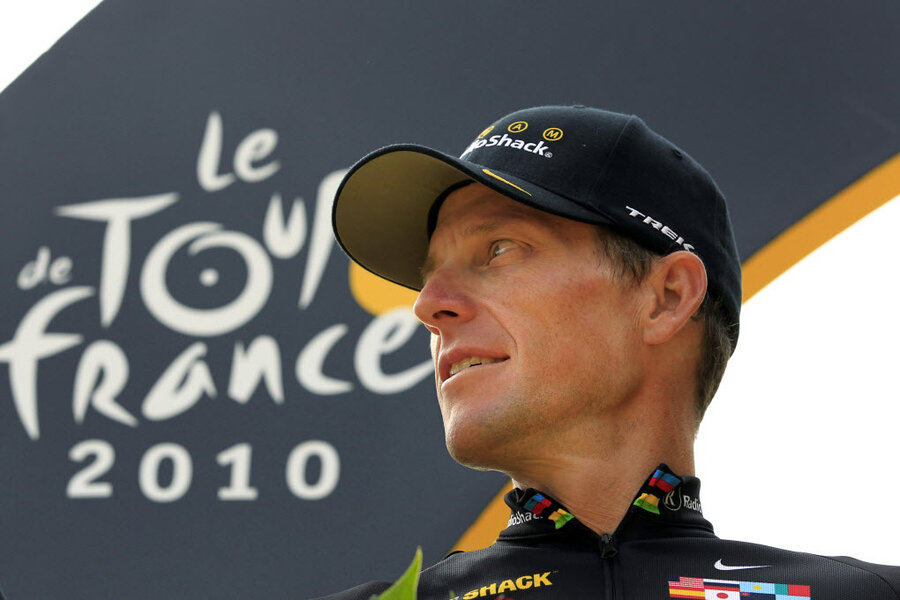Lance Armstrong may take lie detector test
Loading...
| Paris
Lance Armstrong might take a lie detector test to clear his name from doping allegations, his lawyer said on Sunday, as the ripples of the biggest scandal to hit cycling prompted Australian officials to consider an amnesty for cheats.
Cycling Australia's board will meet this week to decide action against Armstrong's former team mate, Matt White, after he confessed to doping and stepped down as sports director of the Orica-GreenEDGE team.
Board president Klaus Mueller said amnesty was one of options to find out how deep the problem was in Australia.
Another former team mate of the American, Scot David Millar, said "the power of omerta" had kept cyclists silent about doping for years but that had changed in the wake of the United States Anti-Doping Agency's (USADA) damning report on Armstrong.
"If you spoke out, you were isolated. Look at what happened to the handful that did. That's the power of the omerta. That's not the case anymore," Millar, who was suspended for two years for doping in 2004, said in an interview with Scotland's Sunday Herald.
Armstrong is set to lose his record seven Tour de France titles after the USADA published a 1,000-page report on Wednesday that said the now-retired American took part in and organised an elaborate and sophisticated doping scheme on his way to his unrivalled success on the Tour.
Armstrong has always denied he took banned substances during his glittering career but refused to challenge the USADA charges against him.
His lawyer Tim Herman told the BBC's Radio 5 Sportsweek on Sunday that the Texan cyclist might take a lie detector test to prove his innocence.
"We might do that, you never know," Herman said, although he admitted that public perception of the American would be hard to change whatever the result of such a test.
"He's moved on. His name is never going to be clear with anyone beyond what it is today," said Herman, adding that he would like the 26 witnesses who testified against Armstrong to take lie-detector tests as well.
"I would not challenge the results of a lie detector test with good equipment, properly administered by a qualified technician. That's a pretty simple answer," he said.
UCI AWAITED
Cycling's world governing body, the International Cycling Union (UCI), has yet to rule on the USADA report. They can either confirm Armstrong's life ban and strip him of his seven Tour titles or take the matter to the Court of Arbitration for Sport (CAS).
Armstrong, one of the world's most famous athletes who is well known for his cancer-fighting charity work, had said he was a victim of a witch hunt.
Millar, who was Armstrong's team mate for a year in 1997 at French team Cofidis, praised his Garmin-Sharp team mates Christian Vande Velde, David Zabriskie and Tom Danielson for testifying against Armstrong.
"They're humiliated, embarrassed and frightened - all of that. Their lives will never be the same again. It's going to be very hard for them. I know it will," he said.
Millar called on UCI president Pat McQuaid to sever ties with honorary president Hein Verbruggen, the governing body's boss until 2005, because the Dutchman had failed to act against doping.
"We're all culpable for this but the UCI flatly deny it and refuse to be accountable. It's obvious they knew what was going on," he said.
"The sport has got better since McQuaid came in but he has to break free of Verbruggen.
"I don't think the UCI are doing a bad job now, they're at the forefront of anti-doping but they're self-sabotaging by not dealing with the past. This is Pat's moment. Now it's up to him."
Miller said it was possible more doping cheats might be unearthed.
"Increasingly the material is coming out to suggest that, certainly up until 2005, there was certainly in some teams systematic cheating," he said.
Cycling Australia's Mueller said an amnesty would help the body to discover the true extent of doping.
"In relation to amnesty, we need to speak both to government and the USADA to see if they are happy with the approach," he told reporters in Melbourne.
"It would be, I'd have thought, conditional on any athlete to whom we give an amnesty coming clean and disclosing all relevant issues in relation to his conduct and, if necessary, to also be forthcoming in relation to conduct of others if that helps to clean up the sport."
Additional reporting by Amlan Chakraborty in New Delhi; Editing by Clare Fallon







